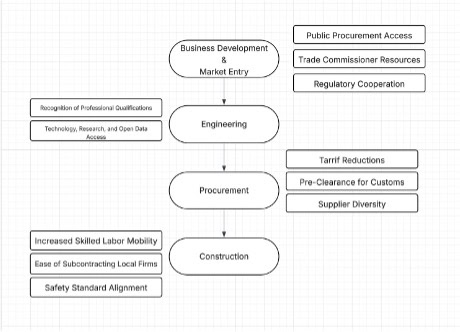How CETA is Impacting the Renewable Energy Sector
By Paula McGarrigle, President & CEO, Solas Energy
The Canadian European Trade Agreement (CETA) was signed in 2016 between Canada and the European Union meant to reduce both tariff and non-tariff barriers to trade. More recently, at the June 2025 European Summit in Brussels, the Canadian prime minister and the European commissioner issued a statement reaffirming their continued commitment to European-Canadian trade collaboration. While many tariffs on environmental goods – goods related to energy efficiency and renewable energy – were already very low or zero percent, CETA works to standardize technical requirements, encourage international development, and streamline the supply chain process. Beyond this, the Canadian raw materials that are critical for the production of these goods, also saw major tariff reductions.
Canada and Europe both have growing renewable energy sectors, parallel environmental initiatives, and resources for clean technology firms to utilize – making trade between them highly beneficial in advancing the energy transition.
Canada launched its international business development strategy (IBDS) for clean technology in 2018, supplementing CETA for environmental goods and services, and coinciding with the international release of Cleantech Global Initiative which looked to increase the number of global firms specializing in clean technology. Canada also updates its Clean Technology Data Strategy (CTDS) enabling easier tracking of the clean technology markets.
Snapshot of CETA’s effects on the energy market
- 12% Increase in Goods, 46% Increase in Services
- EU Imports of Solar increased 65% between 2019-2024
CETA’s benefits across the industry cycle

Public Procurement Access
- European and Canadian firms have access to the public procurement sites
Trade Commissioner Resources
- Provincial and Federal governments in Canada, as well as local organizations provide free resources to firms, especially small and medium sized enterprises to help them navigate CETA and utilize the benefits – including trade missions to conferences, subsidies, and export help.
Regulatory Cooperation
- CETA established a regulatory commission forum that helps establish shared standards or Mutual Recognition Agreements allowing Canadian and European products that meet origin standards to be utilized in the international project.
- Small Biomass boilers recently had a mutual recognition agreement go through.
- The United Nations Economic Commission for Europe (UNECE) environmental standards meet both Canadian and European requirements
Recognition of Professional Qualifications and Mobility of Skilled Labor
- Work to mutually recognize engineering and other skilled labour qualifications to allow practice where business is occurring
- Ongoing commitment of both parties to non-discrimination
- Streamlined long-term travel for work and cross-border employment processes
Technology, Innovation, and Open Data
- Commitment to collaborative research, database sharing, and enforcement of intellectual property
Tariff Reductions
- 98% reduction of tariffs between the European Union and Canada
Customs and Supply Chain Ease
- Priority at some ports
- Pre-Clearance Forms save time and storage waiting for customs clearance
- Rules of Origin allow quick assessment of eligibility for CETA
Supplier Diversity
- Access to both Canadian and European markets supports competitive pricing, innovation, and the ability to acquire novel technology and solutions
Investment
Foreign direct investment protections have yet to be ratified in the agreement, but there has been a 40bn euro per year increase in European investment in Canada post-CETA which can be attributed to Canadian critical minerals, policy alignment, and a strong EURO.
Increasing Preference Utilization Rates for Small and Medium Sized Enterprises
Canadian Provincial and Federal Governments can help corporations understand how to enter European markets and export/import goods and services through the Trade Commissioner Service (TCS) which is free for Canadian businesses to access. There have been extensive efforts to ensure that Canadian and European Small and Medium Sized Enterprises (SMEs) can benefit, hoping to increase the utilization of the trade agreement. Frequently local organizations also hold workshops to help guide companies through the process, like the Alberta government and Calgary Economic Development joint ‘Strengthening Ties with France’ event in May 2025. Further, the trade commission has executed trade missions to renewable energy conferences like the 2025 World Hydrogen Summit in Rotterdam (Can Export GAC-Led Delegations). These services are crucial to overcome barriers disproportionately faced by SMEs, such as low levels of information on foreign market conditions and issues in the procurement of small contracts to anchor distribution infrastructure. Machinery is a cornerstone of EU exports to Canada, and especially relevant to the clean energy sector – like wind gear boxes. However, preference utilisation rates (PURs) are the lowest for small and medium sized enterprises exporting machinery in both directions, indicating a need for education for both those looking to import European products and European companies looking to expand into the market.
CETA continues to demonstrate its strategic value in advancing clean energy collaboration and sustainable economic growth between Canada and the European Union. By reducing trade barriers, harmonizing regulatory standards, and opening access to procurement and investment opportunities, the agreement enables both regions to strengthen their renewable energy industries and accelerate the global energy transition. Yet, to fully realize these benefits, increasing awareness and utilization of CETA among small and medium sized enterprises remains essential. With ongoing government support, trade missions, and education initiatives, CETA’s framework not only fosters innovation and market access but also positions Canada and Europe as key partners in building a cleaner, more connected global economy.
